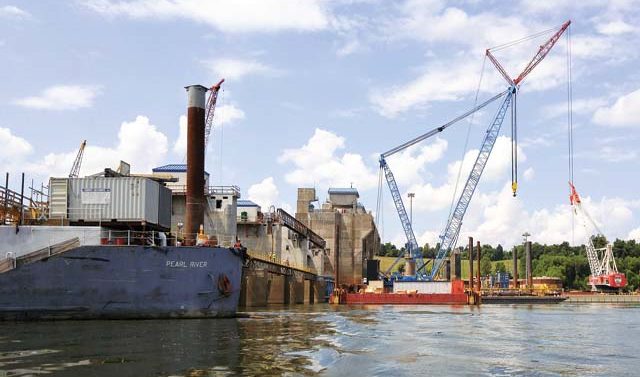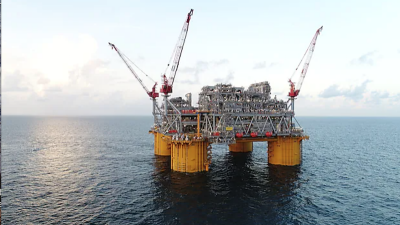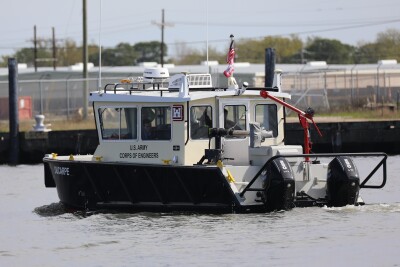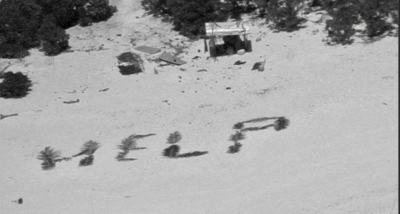With the Ohio River and a dozen barges for his backdrop, President Trump on Wednesday promised a wave of new investment to revitalize inland waterways infrastructure.
Trump said his administration’s still-emerging infrastructure plan will include fixes for “a dilapidated system of locks and dams that is on average more than 50 years old,” and an $8.7 billion maintenance backlog.
“We are the nation that created the Panama Canal, the Transcontinental Railroad, the Interstate Highway System,” said Trump, as an oversized American flag flew from an Ingram Barge Co. towboat behind him. Under a new infrastructure program, improvements to the nation’s 12,000 miles of inland waterways will happen sooner, he said.
“Not these ones that take 18 years,” Trump added, an apparent reference to the Corps of Engineers’ Olmsted Locks and Dam project on the Ohio River, at $3 billion the most expensive inland project ever.
“America must have the best, fastest and most reliable infrastructure in the world,” he said."America built the Golden Gate Bridge in just four years, and the Hoover Dam in five years."
Trump faced a welcoming audience of 500 at the Rivertowne Marina in Cincinnati’s East End, including members of the maritime trades, local union ironworkers, builders and business operators. His remarks were welcomed by industry, although questions remain about infrastructure funding and the administration’s revival of a twice-defeated proposal for a new waterway user fee.
“We were really pleased to see he used key facts” about system-wide infrastructure needs, said Mike Toohey, president and CEO of the Waterways Council Inc. “Presidential leadership we’ve been lacking, and now we’ve got it.”
“Presidential leadership is what delivered the Interstate Highway System” during the Eisenhower administration in the 1950s, “and Roosevelt got the dams and locks started” in the 1930s and ‘40s, Toohey said.
Still, Toohey added, “the devil is in the details.” A six-page infrastructure policy statement issued by the White House this week says a waterway user fee — contained in the administration’s earlier budget proposal, to the tune of an additional $100 million a year on river users — would be used to finance improvements, without offering more detail. The Waterways Council, which has opposed new user fees, countered with its own proposal for using money from the present 29 cents per gal. diesel fuel tax, combined with the administration’s idea of allowing corporations to invest cash repatriated from their overseas operations.
While Trump continues to portray the infrastructure initiative as a $1 trillion program, it represents a major re-ordering of the relationship between the federal government and states, cities and other local partners. The administration proposes $200 billion in federal spending, to leverage state and local contributions and private investment.
That philosophy, explicitly laid out in the administration’s earlier statement, will be “forging new partnerships and demanding new accountability for every federal dollar,” Trump said.
In his remarks running over 20 minutes, Trump veered to health care, saying “we must repeal and replace Obamacare,” and complained about Democratic members of Congress refusing to sign onto his infrastructure initiative. Democratic leaders like Sen. Charles Schumer, D-NY, have cast the plan as benefitting private investors by raising new tolls on highways and bridges.
“Every single thing is obstruction,” Trump said. “I’m calling on all Democrats and Republicans to be partners in the reconstruction.”
Referring to the Ingram barges behind him, Trump touted his other economic policies.
“They’re filled with West Virginia coal…we’re putting the miners back to work,” Trump said. “Wait until you see what I’m going to do with steel.”





